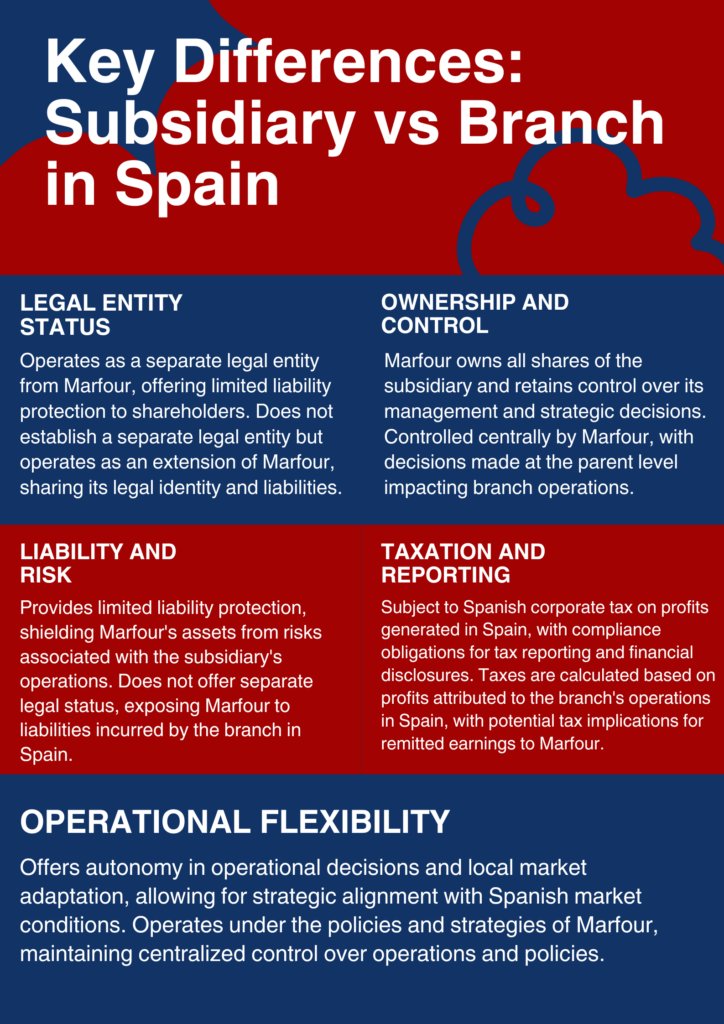Set Up a Branch or Subsidiary in Spain
Are you thinking about expanding your business reach into Spain? Whether you’re considering opening a company in Spain, Set Up a Branch or Subsidiary in Spain, understanding the process is crucial.

Each option—opening a branch in Spain or creating a subsidiary—comes with its own set of advantages and legal considerations. Here, we’ll break down what you need to know to make an informed decision and navigate the exciting opportunities Spain has to offer for your business expansion.
Difference Between Company, Branch, or Subsidiary?
When expanding your business into Spain, it’s crucial to understand the differences between setting up a company, opening a branch, or establishing a subsidiary. Each option has distinct legal, operational, and strategic implications tailored to different business needs and objectives.
Overview of Business Structures
Open a Company in Spain
- Definition and Process: Establishing a company in Spain involves creating a new legal entity under Spanish law. This entity operates independently and assumes full liability for its activities. The process includes registering with the Spanish Commercial Registry, drafting articles of association, appointing directors, and fulfilling capital requirements if applicable.
- Ownership and Control: Shareholders own the company and have control over its operations and management decisions. This structure provides autonomy in decision-making and strategic direction.
- Advantages: Opening a company allows for full control over business operations, flexibility in governance, and potential tax advantages depending on the chosen corporate structure (e.g., SL or SA).
Opening a Branch in Spain
- Definition and Process: A branch is an extension of a foreign company’s operations in Spain. It operates under the authority and policies of the parent company without creating a separate legal entity. The process involves registering the branch with the Spanish Commercial Registry, appointing a legal representative in Spain, and submitting the parent company’s financial information.
- Control and Integration: The parent company maintains control over the branch’s operations, policies, and strategic decisions. This structure facilitates easier integration of the parent company’s corporate culture and policies into the Spanish market.
- Advantages: Opening a branch allows for market expansion with minimal setup costs, centralized management, and operational consistency across international markets.
Opening a Subsidiary in Spain
- Definition and Process: A subsidiary is a distinct legal entity established in Spain, wholly owned by a foreign parent company. The process includes registering the subsidiary with the Spanish Commercial Registry, drafting articles of association, appointing directors, and meeting capital requirements as per Spanish law.
- Ownership Structure: The foreign parent company owns all shares of the subsidiary and controls its management and operations. This structure provides limited liability protection and a separate legal identity in Spain.
- Advantages: Establishing a subsidiary offers protection against the parent company’s liabilities, facilitates local market presence with a Spanish corporate identity, and allows for independent financial management and decision-making.
Legal Framework and Requirements

Company Formation Requirements
- Documentation: Required documents typically include articles of association, identification documents of directors and shareholders, and proof of initial capital deposit, if applicable.
- Registration Process: To operate legally in Spain, companies must register with the Spanish Commercial Registry and obtain tax identification numbers (NIF).
- Governance and Compliance: Companies must adhere to Spanish corporate governance laws, including holding shareholders’ meetings, filing annual reports, and complying with tax regulations.
Branch Establishment Criteria
- Legal Representative: A branch must appoint a legal representative residing in Spain who acts on behalf of the branch and ensures compliance with local laws.
- Financial Disclosure: Branches are required to submit financial statements and other documentation of the parent company to Spanish authorities to demonstrate financial stability and compliance.
- Taxation: Branches are subject to corporate income tax on profits generated in Spain, with potential obligations for withholding taxes and transfer pricing compliance.
Subsidiary Registration Process:
- Capital Requirements: Spanish law stipulates that subsidiaries must deposit minimum capital, which varies depending on the chosen legal entity (e.g., SL or SA).
- Corporate Governance: Subsidiaries operate under Spanish corporate governance laws, which include appointing a board of directors, holding shareholders’ meetings, and adhering to reporting requirements.
- Taxation: Subsidiaries are subject to Spanish corporate tax on income generated in Spain and may benefit from tax treaties between Spain and the parent company’s home country, reducing potential tax liabilities.
Operational Considerations
- Business Activities: Each business structure allows for different types of business activities based on legal requirements and regulatory compliance in Spain. Companies and subsidiaries enjoy greater flexibility in conducting independent business activities, while branches typically replicate the activities of the parent company.
- Tax and Compliance: Companies and subsidiaries must comply with Spanish corporate tax laws, including filing VAT returns and other indirect taxes applicable to their operations.
Branches face specific tax implications related to transfer pricing, withholding taxes, and tax reporting requirements in Spain and the parent company’s home country.
Management and Control
Companies and subsidiaries have distinct management structures, with local directors responsible for day-to-day operations and strategic decision-making.
Branches operate under the direct management and policies of the parent company, maintaining centralized control over business operations and policies.
This detailed explanation provides a comprehensive understanding of each aspect related to setting up a company, branch, or subsidiary in Spain. It covers legal requirements, operational considerations, and strategic implications for businesses expanding into the Spanish market.
Steps to Open a Company in Spain
Begin by defining your business concept and assessing its viability in the Spanish market. Based on your business goals and capital requirements, choose a suitable legal structure, such as a Sociedad Limitada (SL) or Sociedad Anónima (SA). Conduct thorough market research to understand local demand, competition, and regulatory requirements.

Drafting Articles of Association
Prepare the necessary legal documentation that outlines the company’s details, including business activities, shareholder rights, and governance structure. Ensure a Spanish notary public notarizes these articles to validate their legal standing.
Appointment of Directors and Shareholders
Select directors who will oversee the company’s daily operations and represent it legally. Define the ownership structure and allocate shares among shareholders according to agreed-upon terms.
Capital Requirements and Bank Account
Deposit the minimum required share capital into a Spanish bank account, which varies based on the chosen legal entity (SL or SA). Open a corporate bank account with a Spanish bank to facilitate financial transactions and operations.
Registration with Commercial Registry
Prepare and submit the necessary company formation documents, including the articles of association, to the Spanish Commercial Registry (Registro Mercantil). Obtain a Tax Identification Number (NIF) from the Spanish Tax Agency (Agencia Tributaria) to formalize the company’s legal status.
Licensing and Permits
Obtain any required local licenses or permits specific to your business activities in Spain. Ensure compliance with sector-specific regulations, including health and safety standards, environmental requirements, and professional licenses, if applicable.
Post-Incorporation Formalities
Publish the company’s incorporation details in the Official Gazette (Boletín Oficial del Registro Mercantil) within the specified timeframe. Maintain accurate corporate records, including minutes of shareholders’ meetings and resolutions, to fulfill ongoing corporate governance requirements.
Tax Registration and Compliance
Register the company for corporate income tax with the Spanish Tax Agency. Additionally, if applicable, register for Value Added Tax (VAT) to comply with indirect tax obligations related to business operations in Spain.
Employment Matters
If hiring employees, register the company as an employer with the Spanish Social Security system (Seguridad Social). Prepare and execute employment contracts that adhere to Spanish labor laws and regulations.
Compliance and Reporting Obligations:
Regularly file annual financial statements and reports with the Spanish Commercial Registry and Tax Agency. Ensure ongoing compliance with corporate governance requirements, including holding annual general meetings and updating corporate records as required by law.
Setting Up a Subsidiary: What You Need to Know
Initial Planning and Decision-Making
- Business Strategy: Determine the strategic rationale for establishing a subsidiary in Spain. Evaluate factors such as market potential, growth opportunities, and legal considerations.
- Legal Structure: Choose a suitable legal entity for the subsidiary, such as a Sociedad Limitada (SL) or Sociedad Anónima (SA), based on business objectives and capital requirements.
Registration Process
Company Formation: Register the subsidiary with the Spanish Commercial Registry (Registro Mercantil). Prepare and submit articles of association detailing corporate governance, shareholder rights, and business activities. Capital Requirements: Deposit the minimum required share capital into a Spanish bank account as stipulated by Spanish law.
Governance and Management
Board of Directors: Appoint directors who will oversee Marfour’s subsidiary operations and represent the interests of the parent company. Shareholder Structure: Define the ownership structure and allocate shares among Marfour and any other shareholders as agreed upon.
Compliance and Reporting
Legal Compliance: Adhere to Spanish corporate governance laws and regulations, including holding annual general meetings and maintaining accurate corporate records. Taxation: Understand the subsidiary’s tax obligations, including corporate income tax on profits generated in Spain and potential tax treaties between Spain and Marfour’s home country.
Operational Integration
Operational Autonomy: Manage day-to-day operations independently while aligning with the strategic direction set by Marfour. Local Adaptation: Tailor business operations to meet local market demands, consumer preferences, and regulatory requirements in Spain.
Key Differences: Subsidiary vs Branch in Spain

Legal Entity Status
Operates as a separate legal entity from Marfour, offering limited liability protection to shareholders. Does not establish a separate legal entity but operates as an extension of Marfour, sharing its legal identity and liabilities.
Ownership and Control
Marfour owns all shares of the subsidiary and retains control over its management and strategic decisions. Controlled centrally by Marfour, with decisions made at the parent level impacting branch operations.
Liability and Risk
Provides limited liability protection, shielding Marfour’s assets from risks associated with the subsidiary’s operations. Does not offer separate legal status, exposing Marfour to liabilities incurred by the branch in Spain.
Taxation and Reporting
Subject to Spanish corporate tax on profits generated in Spain, with compliance obligations for tax reporting and financial disclosures. Taxes are calculated based on profits attributed to the branch’s operations in Spain, with potential tax implications for remitted earnings to Marfour.
Operational Flexibility
Offers autonomy in operational decisions and local market adaptation, allowing for strategic alignment with Spanish market conditions. Operates under the policies and strategies of Marfour, maintaining centralized control over operations and policies.
Legal Considerations for Branches and Subsidiaries
Regulatory Requirements
Must comply with local registration and reporting requirements, including submission of financial statements and documentation of the parent company’s legal status.
Governed by Spanish corporate law, with mandatory registration, governance structures, and compliance with tax and reporting obligations.
Governance Structures
Operates under the governance and oversight of the parent company, with decisions made centrally and implemented locally. Establishes its governance framework, including a board of directors and shareholders’ meetings, following Spanish corporate governance principles.
Financial Disclosure
Required to disclose financial statements of the parent company to demonstrate financial stability and compliance with local regulations.
Prepares and submits financial statements independently, reflecting the economic performance and operations of the subsidiary in Spain.
Benefits of Opening a Business in Spain

Strategic Location
- Geographical Advantage: Access to European markets and proximity to North Africa, enhancing trade and investment opportunities.
- Infrastructure: Modern infrastructure, including transportation networks and digital connectivity, supports business operations and logistics.
Business-Friendly Environment
- Regulatory Framework: Transparent and predictable regulatory environment, promoting ease of doing business and foreign investment.
- Supportive Policies: Government incentives, grants, and subsidies for startups and foreign companies expanding operations in Spain.
Skilled Workforce
- Educational System: High-quality education system producing skilled professionals across various industries, supporting business innovation and growth.
- Multilingual Talent: Access to a multilingual workforce proficient in Spanish, English, and other European languages, facilitating international business operations.
Economic Stability
- Market Access: Integration into the European Union (EU) single market, benefiting from tariff-free trade and economic stability within the Eurozone.
- Industry Diversity: Diverse economic sectors, including tourism, renewable energy, technology, and automotive industries, offer investment opportunities across multiple sectors.
Quality of Life
- Cultural Diversity: Rich cultural heritage, vibrant cities, and a high quality of life attract international talent and foster a favorable environment for business development.
- Healthcare and Social Security: Access to universal healthcare and social security benefits for employees, supporting employee welfare and retention.
FAQs about Set Up a Branch or Subsidiary in Spain:
These answers provide concise explanations of common queries related to establishing a branch or subsidiary in Spain, emphasizing key considerations such as legal structure, regulatory compliance, taxation, and government support initiatives.
What are the main differences between establishing a branch and a subsidiary in Spain?
A branch operates as an extension of the parent company in Spain, sharing its legal identity and liabilities. In contrast, a subsidiary establishes a separate legal entity, offering limited liability protection and autonomy in local operations under Spanish corporate law.
What are the key legal and regulatory requirements for setting up a branch or subsidiary in Spain?
Setting up a branch involves registering with the Spanish Commercial Registry, appointing a local legal representative, and complying with local tax laws and reporting obligations. Establishing a subsidiary requires drafting articles of association, registering with the Commercial Registry, and adhering to Spanish corporate governance laws.
How can I choose between opening a branch or a subsidiary in Spain?
Choose based on factors like liability protection, operational autonomy, tax implications, and strategic goals. A branch offers direct control but carries higher liability risks, while a subsidiary provides legal separation with administrative oversight.
What are the taxation implications for branches and subsidiaries in Spain?
Branches are taxed on profits generated in Spain, subject to corporate income tax and potential withholding taxes. Subsidiaries also pay corporate income tax but may benefit from tax treaties and local deductions.
What support does Spain offer for foreign businesses setting up operations?
Spain offers incentives like grants, subsidies, and tax incentives to promote foreign investment, particularly in technology, renewable energy, and innovation sectors. Its infrastructure, skilled workforce, and EU market access further enhance its appeal to international businesses.
Conclusion
In summary, establishing a branch or subsidiary in Spain offers businesses strategic advantages in navigating European markets. Whether choosing a branch for direct control under the parent company’s legal umbrella or a subsidiary for autonomy and limited liability, understanding regulatory requirements and tax implications is essential.
Spain’s business-friendly environment, supported by incentives and infrastructure, makes it an attractive destination for international expansion within the European Union in diverse sectors like technology and renewable energy.
Branches set up in spain
clients assisted
%
clients satisfied
WHAT DOES THIS SERVICE INCLUDE?
- Giving advice about the most suitable structure for your business.
- Obtaining the parent company’s NIE and opening a bank account.
- Drafting the Article of Association.
- Signing the establishment deed at the Notary.
- Company Registration at the Companies House.
- Set up a branch or subsidiary.
Testimonials
![]()
![]()
MARFOUR SETS UP YOUR BRANCH AND SUBSIDIARY
Contact us, and Marfour International Law Firm will assist you in Set Up a Branch or Subsidiary in Spain. One of our specialized English-speaking lawyers will contact you immediately to advise you. Do not hesitate to send us your enquiry.

